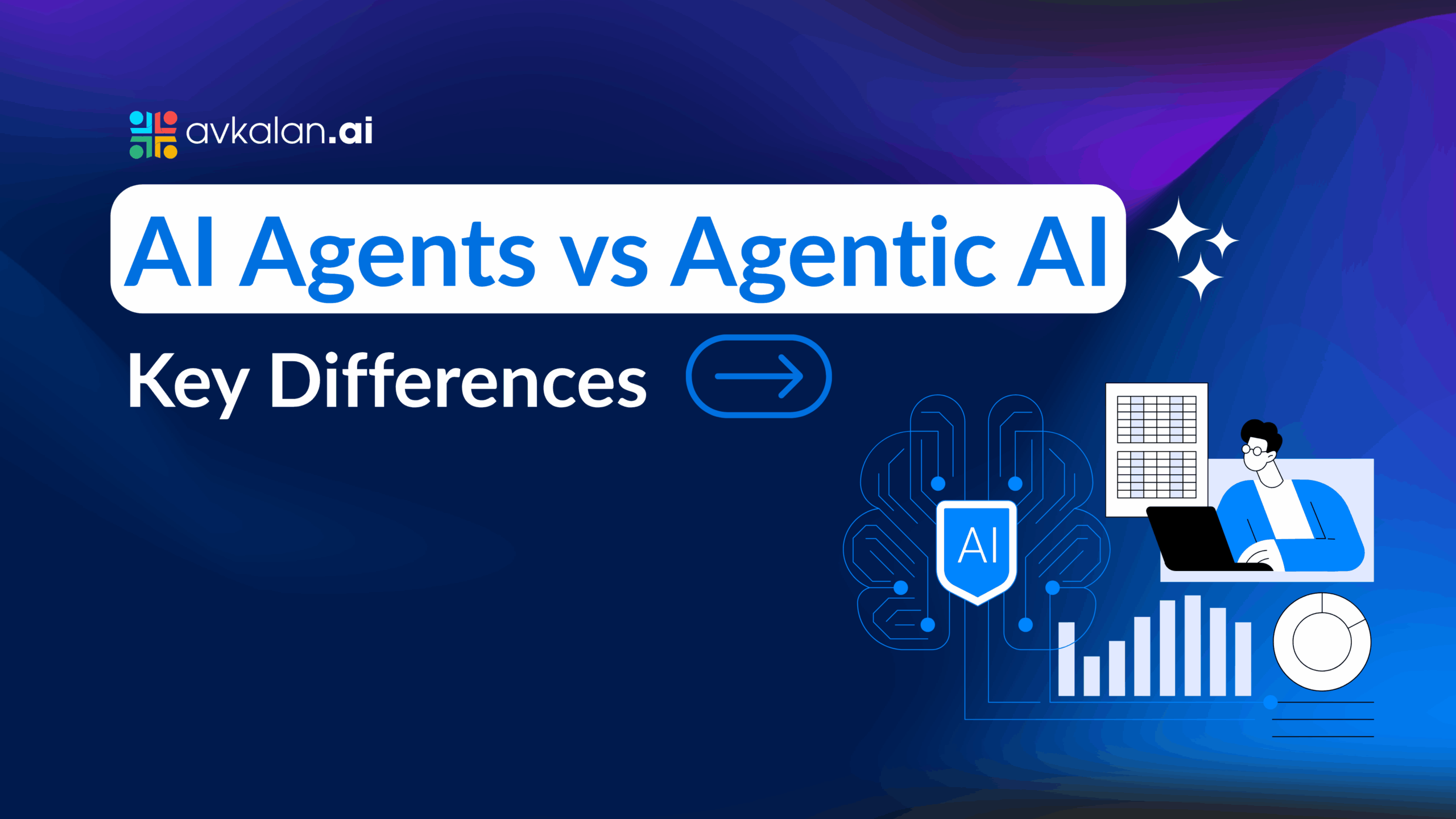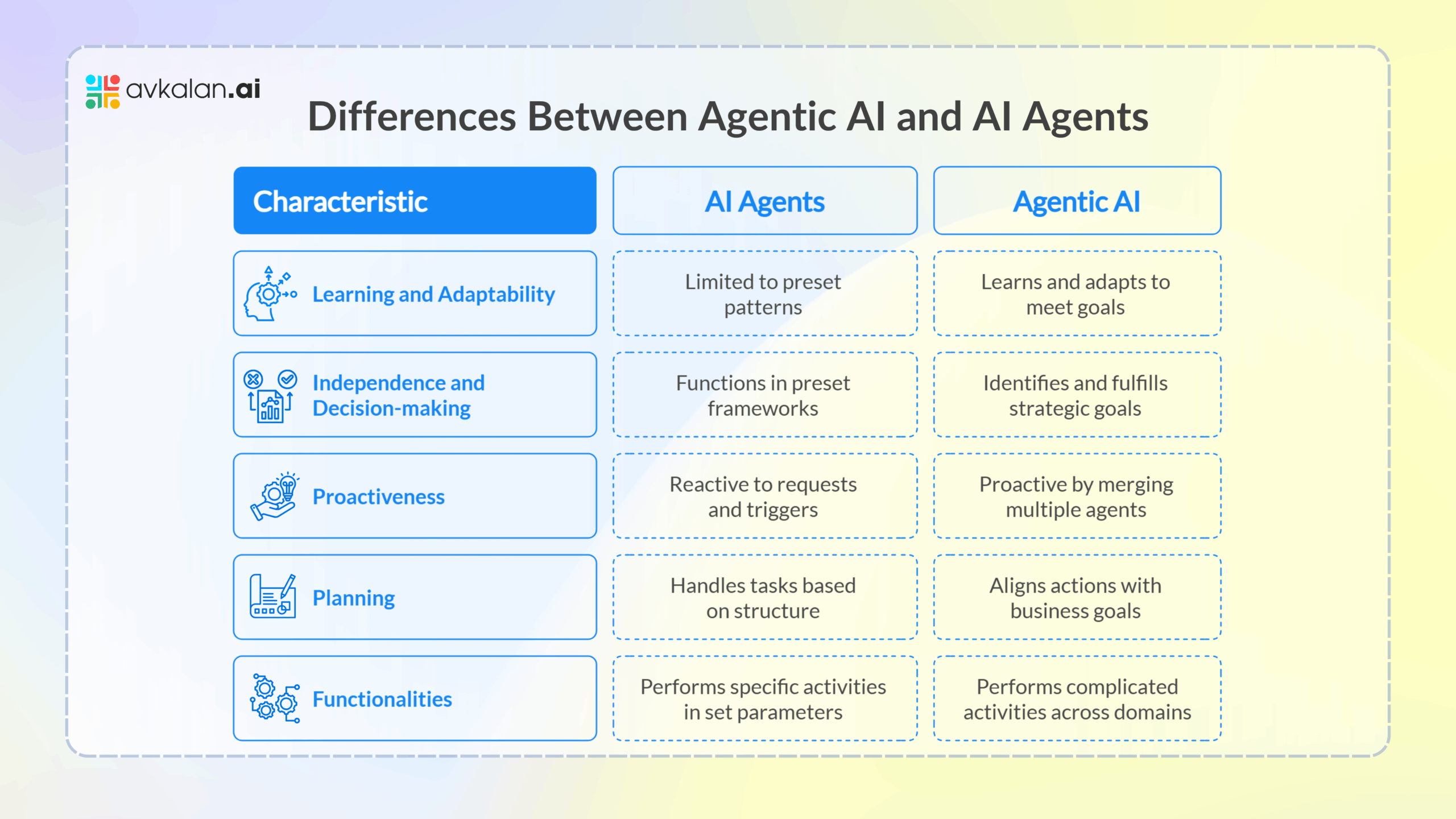
Businesses worldwide use AI agents and Agentic AI nowadays. AI agents can precisely manage certain activities, while Agentic AI performs more complicated tasks, solves real-time problems, and makes smart decisions. Before implementing either AI Agent or Agentic AI for your business, you should learn the differences between them to avoid choosing the wrong option suited to your requirements. This blog outlines their definition, types, key differences, use cases, and future for automation. Let’s dive in.
What is an AI Agent?
AI agent, a software, is built to understand the environment, process data, and take the required actions to meet certain goals. Such agents can be simple or highly advanced, which can handle easy to complicated tasks. The capabilities of numerous AI agents may grow significantly when they function together. Rather than focus on a single portion of a process, AI agents may collaborate to manage complicated workflows and fulfill more advanced requirements.
Let’s say three AI agents may work together to efficiently fix customer issues. One agent may handle natural language processing, another agent may search for related knowledge and the third agent may route tickets. AI agents may function both autonomously and like a team. Every AI agent makes decisions depending on what they are programmed to do and the data they get. Multiple agents can face those challenges, which will be too difficult to manage for one agent.
Types of AI Agents
Here are the different types of AI agents depending on various tasks:
- Learning Agents : Learning agents work depending on experience, like a customer support Chatbot, which gets better at replying to queries via interactions.
- Model-based Agents : Model-based agents make smart decisions depending on the environment’s internal depiction.
- Utility-based Agents : Utility-based agents make choices by evaluating probable results, like an AI trading system, which evaluates market elements.
- Reflex Agents : Reflex agents directly respond to user inputs with pre-decided and change actions depending on the current condition.
- Goal-based Agents : Goal-based agents help in fulfilling certain motives, like sorting objects.
What is Agentic AI?
Agentic AI is an AI system featuring independent decision-making, advanced reasoning, learning, adapting, and taking goal-driven actions.
Unlike AI agents, which utilize a single agent to focus on a specific task, Agentic AI employs multiple agents to handle complex workflows on their own, learning and adapting in real-time based on experience and feedback.
An IT support system using non-agentic AI might just sort support tickets and give scripted replies. However, an agentic AI-powered system can understand a user’s issue through natural language, access the right systems, figure out the best solution, and then take action, like resetting passwords or changing permissions.
Four main features set agentic AI apart from traditional AI:
- Autonomous decision-making : Agentic AI doesn’t just follow simple rules—it can also analyze situations, decide what to do, and act independently without the need for constant human input.
- Goal-driven actions : While traditional AI focuses on recognizing patterns, agentic AI works toward specific objectives by planning and carrying out multi-step tasks.
- Learning and adapting : Instead of static algorithms, agentic AI learns from interactions and outcomes, improving its performance and adjusting its approach in real time.
- Advanced reasoning: Agentic AI can connect to multiple systems, coordinate across different tools and databases, and autonomously manage complex workflows.
Traditional AI models can work effectively in their narrow niches, such as content generation and data analysis. Agentic AI offers scalability, flexibility, and actionability in various applications. It can help in automating and streamlining operations with minimum human efforts.
What are the Differences Between Agentic AI and AI Agents?
Both Agentic AI and AI Agents collect information, function, and make decisions autonomously. AI agents, the autonomous entities, can manage specific activities in set parameters. While Agentic AI functions as a conductor by merging multiple AI systems and agents to meet larger business goals. AI agents and Agentic AI offer high values when formulating an automation plan. However, they have these key differences depending on the categories below.

1. Learning and Adaptability
AI agents may perform specific activities by following certain patterns. However, Agentic AI can learn, adapt, and modify as required to meet goals. AI agents usually improve via programming updates. While Agentic AI may learn from interactions and modify approaches depending on outcomes and new scenarios. Such adaptability works mainly in a dynamic environment. Agentic AI can identify the latest trends, adjust its approaches, and suggest solutions to possible challenges, which AI agents aren’t capable of doing.
2. Independence and Decision-making
Autonomy is one of the key differences between AI agents and Agentic AI. The agents function in preset frameworks; however, they may adapt and make choices depending on real-time inputs and traffic conditions. Agentic AI has more effective decision-making capacities, such as identifying and fulfilling strategic goals, and assessing multiple options to make goal-oriented and complicated decisions. Agentic AI learns from experiences to boost performance and adapt to real-time changes in the scenario.
3. Proactiveness
Being able to learn over time, AI agents can get reactive and reply to requests and triggers. They may process a password reset request when users submit it. Agentic AI can get more proactive by merging multiple agents to offer new solutions and take action without any prompts. It can identify spots in access issues, suggest solutions, and flag possible cybersecurity threats before the issues get more complicated.
4. Planning
Both AI agents and Agentic AI follow different approaches to planning. AI agents can handle everything, from simple tasks to long-term requirements, depending on their structure. Agentic AI functions by merging many processes and systems, which keeps the actions aligned with business goals, manages complicated workflows, and upgrades processes as and when required.
5. Functionalities
Functionalities differ significantly in AI agents and Agentic AI. AI agents function in set parameters and perform more specific activities, which means training and programming restrict their efficiency. Agentic AI functions on a wider scale by merging multiple abilities to perform complicated and multi-step activities, which require coordination across domains and systems.
Use Cases for AI Agents and Agentic AI
AI Agents and Agentic AI have transformed business operations. You can make the most of these two technologies once you learn how they fit the below use cases.
- Security : Both AI Agents and Agentic AI can add security to your assets and operations. AI agents are likely to scale operations and escalate security. Agentic AI helps in detecting and resolving threats, modifying security protocols as new threats occur, syncing replies across multiple security tools, and learning from new threats how to better detect future risks.
- Service Desk Automation : AI agents and Agentic AI functions together in service desk operations. Agentic AI is likely to handle tasks such as preferring tickets depending on business effects, learning from previous resolutions to suggest the right solutions, and managing complicated resolutions across multiple systems. AI agents can manage desk activities, such as automating password resets via identity verification, give quick responses to IT issues with VAs and chatbots, and manage access requests depending on preset security and compliance rules.
- HR Operations : HR teams do everything from sourcing talent to keeping employees satisfied. Agentic AI helps in automating HR operations following a wider approach, handling numerous processes simultaneously, and adjusting to the changing scenario. Agentic AI analyses employee requests, updates, and self-service features and makes improvements across the system without manual input. AI Agents can process and help in checking leave requests by assessing factors, like project deadlines. They can offer guidance on personalized benefits by assessing employee data and roles. Plus, they can handle document workflows via routing and automated validation.
AI Agents and Agentic AI are Here to Stay
Businesses are embracing smarter systems combining AI’s efficiency in managing tasks with Agentic AI’s adaptive intelligence. With our professional AI services, you can make the most of either of these two technologies. AI is getting more advanced with better learning capabilities, which eliminate manual efforts and decision-making algorithms that may fix complicated challenges. Since now you know the differences between Agentic AI and AI agents, your business can have a smarter future with the correct implementation.
